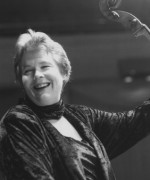Column Name
Title
Bonnie Hampton, a native of Berkeley, Calif., did not follow a “traditional” path when it came to pursuing an education in music. Exposed to classical music at a young age—some of her early memories involve hearing the Juilliard String Quartet in performances at the University of California in her home town—she took courses at U.C. Berkeley and received tutoring from university and conservatory teachers in San Francisco, but never received a degree. She was performing a great deal by the age of 15, and at 18 she began teaching cello at the San Francisco Conservatory of Music. Bonnie took her first faculty position at Mills College at age 23, and she is a founding member of the Francesco Trio, which was formed in 1964. She has been on the faculties of Stanford University, U.C. Berkeley, and the San Francisco Conservatory. She joined the Juilliard faculty in 2003.
Body
When did you first know you wanted to be a musician and how did you come to know it?
It was when I was 13 and had some very wonderful orchestral and chamber music experiences, playing major works, that my direction changed from music being something important in my life to being the thing I knew I wanted to spend my life doing.
Who was the teacher or mentor who most inspired you when you were growing up and what did you learn from that person?
My main musical mentor from the age of 8 was Margaret Rowell, an extraordinary cello teacher and human being. She was not only innovative in her ideas and way of teaching, but exuded a positive energy and love of music. Her influence went beyond music and the cello to giving us an appreciation of art, an awareness of the world events of that time—the Cold War, the thinking of Gandhi and Bertrand Russell. She encouraged me in my love of chamber music and introduced me to the artistry of Pablo Casals, who became the other major musical influence in my life. Studying with him opened directions of musical and instrumental thinking which are still of vivid influence for me today.
What was the first recording that you remember hearing or buying? What was its significance to you?
The Casals recording of the Bach Cello Suites. I started playing the suites quite early in my studies and hearing those old 78 recordings of Casals, with their life and spirit, was enormously important.
If you could have your students visit any place in the world, where would it be, and why?
We all need those “spirit renewing times” in our lives, whether it is through spending time in nature and the life energy this can give, or experiencing a great performance of a work such as Bach’s St. Matthew Passion, or just absorbing a great painting. I feel it is not necessarily one place, as the source of such renewal is different for every individual. But it is important that it exists and that we seek it.
What are your non-music related interests or hobbies? What would people be surprised to know about you?
I wouldn’t exactly call them hobbies, but visiting art galleries and spending time with books is a great pleasure. People might be surprised to know that I lived in Yosemite for a year when I was 12 and won first prize in the riding event for the 12 to 18 age group in the Mariposa Rodeo.
What is your favorite thing about New York City?
The wealth of museums and concert halls in New York and all that is offered in them.
If your students could only remember one thing from your teaching, what would you want it to be?
That while the skills of playing an instrument are of given crucial importance, demanding discipline and perseverance, the lifelong challenge is having the curiosity and openness to seek understanding of the musical language of every individual composer one studies and performs. In other words, a real melding of musical understanding and investigation with instrumental technique in searching for a composer’s expression and meaning and then communicating it to others.
If you weren’t in the career you are in, what would you be doing?
It is not possible for me to contemplate a life other then one involved with music. Other things are important to me but music is central.





